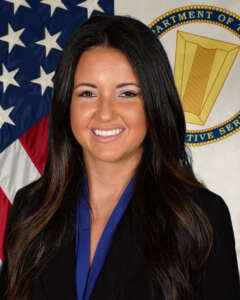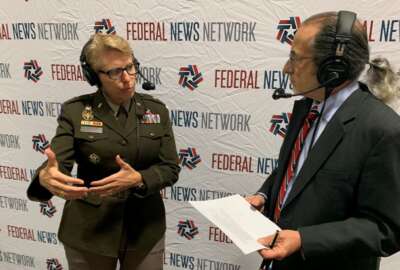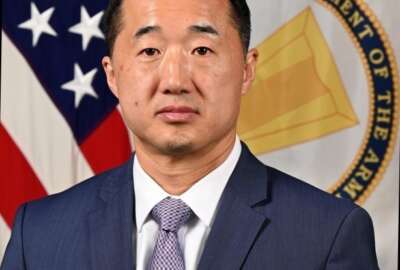60 pages, 3 months of reviews cut from Aberdeen Proving Ground’s acquisition policy
Danielle Moyer, the executive director of the Army Contracting Command at Aberdeen Proving Ground, said during her first few months on the job, she created a review...
The contract policy guide at the Army Contracting Command at Aberdeen Proving Ground became a lot like a ship which needs to scrape the barnacles off every once in a while.
The policy guide was weighing down the acquisition process and impacting ACC’s customers.
Danielle Moyer, the executive director of the Army Contracting Command at Aberdeen Proving Ground, said her office cut 60 pages and three months of reviews from APG’s acquisition process.

“We have the Federal Acquisition Regulations, we have in the Defense Department the Defense Federal Acquisition Regulations, which is a FAR supplement for the Department of Defense. Then for the Army, we have the Army supplement to the FAR and to the DFARs. All these books are huge. So why do we need additional policies? That’s exactly what I looked at,” Moyer said in an interview with Federal News Network. “We asked, ‘what is this? Is this providing us value?’ So literally my first day there, I was given a document to review, and I said, ‘What is this document? I’ve never heard of it. I’ve never seen it.’ And they’re like, oh, it exists in your local policy. Well, I didn’t understand how do we have even local policy when we have all these others?”
Moyer, who joined Aberdeen Proving Ground in February, immediately sought to change the way ACC contracts. She set up an integrated product team (IPT) to review the organization’s acquisition policies and decide what is actually needed and what isn’t.
The IPT included everyone from contracting officers to lawyers to ACC leaders. Moyer said folks reacted to the analysis with disbelief that the command added so many new rules on top of existing rules over time.
“Everyone has been incredibly supportive because everybody wants to do the right thing. They want to have a legally compliant contract. That makes sense, but they want to get it done faster,” she said.
She said too often ACC added new policies or requirements just because something went wrong one time.
“One time something happened, so if we put this policy in place, it may not happen again. But the issue is, that one thing that happened at one time probably only applied to that one situation. There’s things that make sense based on what you’re buying,” Moyer said. “While I think there should be lessons learned, and we should do program management reviews after the fact where we share things, which is really what DoD calls peer reviews, basically so that we can look across the service and see how other people doing things catch things. See how we can do things better. That I completely agree with. But creating policy or additional reviews, that just add time to get things fielded or to get the things we need done, to me, doesn’t necessarily make sense. I’m going to weigh the risk of what that was to getting something awarded faster.”
Everything Moyer has been reviewing and analyzing in her first six months on the job has been around improving the outcomes of the contracting command.
She said speed is critical, but so is quality.
“We are going to change our culture,” Moyer said at the recent Army Technical Exchange Meeting event in Philadelphia. “We want to create a culture of innovation, where mistakes are okay as long as we learn from them. Too often, we are risk adverse because of protests. I’m not against protests, but it has to be a two-way street. Why is it when we give interim contractor performance assessment and rating system or ask for credit, vendors push back? We need their help telling us upfront what doesn’t look right or what can be changed to improve versus us getting protested later.”
Another change Moyer is pushing for is how industry responds to proposals. She said too often ACC gets hundreds of written pages that may or may not meet the Army’s needs.
“In my opinion, getting after oral proposals instead of having to put everybody in a room and read hundreds of pages to try and not miss something that the RFP specifically called out. If you have oral proposals, if you do a phased approach, that’s the way you reduce that time even more, right,” she said. “Everyone wants to do their job and do their part to get something fielded. So it is a culture change because it delegates and empowers people, and it makes people accountable for what they’re doing. It also puts people in their specific lanes.”
Moyer added it’s about managing risk to the Army when buying a product or service to meet the warfighters’ needs.
Moyer said there are three common problems with contractors’ proposals that delay or add complexity to the process.
- Insufficient cost proposals
- Parroting of the solicitation information and not describing their proposed solution
- Proposal formatting issues, including not providing requested information
Moyer said the FAR is specific about how contractors should detail their costs, yet many still struggle.
“Normally it’s like a table in the solicitation and here’s your direct costs, here’s your indirect costs and here’s your other costs. Then we need substantiating data to make sure it makes sense. If you are going to hire the world’s best engineer who has this great experience to develop this next generation of software, and you now proposed $20 an hour for that person, and nothing to back it up, then I’m going to say that’s unreasonable. It’s unrealistic. It could be fair and reasonable, but doesn’t mean it’s realistic. So then I might raise your price, which may cause you to lose,” she said. “Some of it is like teaching people that not only do you have to follow this table, you have to substantiate it. You have to think it through because one of the things we’re going to look at is if it’s realistic because, especially for services, the main biggest mistake is people don’t substantiate their rates and break it down the right way.”
Copyright © 2025 Federal News Network. All rights reserved. This website is not intended for users located within the European Economic Area.
Jason Miller is executive editor of Federal News Network and directs news coverage on the people, policy and programs of the federal government.
Follow @jmillerWFED






